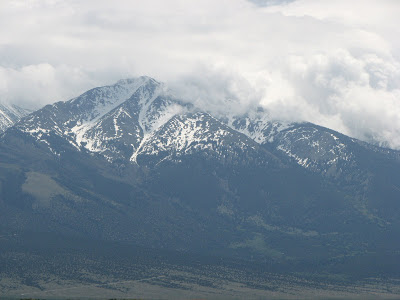 |
| Sangre de Cristo (Blood of Christ) Mountains, Southern Colorado |
If the desert is the place of loneliness,
isolation, temptation, and a thirsting after God, and if the mountain is the place of insight,
revelation, and illumination, then the cloud
is the rare, but powerful, experience of mystical union with God, when one
feels “at one” with God and the world. It is the reward for exercising great
patience, being willing and able “to wait” and “to ponder,” as Mary did as she
awaited the birth of the Christ child.
It is
easy to get discouraged along the way, because the journey up the mountain can
be long, dangerous, and exhausting. We are constantly tempted to simply “give
up.” On top of this, sometimes we fear new revelation because we know it may
radically change us. Strange as it may seem, we humans at times become
comfortable in our pain. As Sheldon Kopp wrote, there are times when a person “prefers the
security of known misery to the misery of unfamiliar insecurity.” [If You
Meet the Buddha on the Road, Kill Him, 1972]
And so
we begin to climb, but it seems so far. So very far. We look back to the valley
below. It seems safer there. It would be so easy to return to the valley below,
even though it is the valley of the shadow of death. (Psalm 23). We deceive
ourselves into thinking we can go back. And often we do. But then, by God’s
grace, there are those times when we gather courage.
We look
up again. We begin climbing again. Step by step, trusting grace and joy await
us. And then an amazing thing happens. A hand reaches down and begins to lift
us up. We arrive at the summit. We feel a mystical union with God beyond
description and comprehension. We lose ourselves in God. Our separate identity
is gone. We feel pure grace. We know we are loved with an everlasting love.
This is what the Celtics call a "thin place," where the boundary
between God and us is nearly erased.
It was
in the pillar of cloud that Moses spoke with God “face to face, as one speaks
to a friend.” (Exodus 33:11)
Our
hearts are also filled with indescribable love for all people. It is when we
finally relinquish the need to control, when we have gone so deeply into
solitude that it appears we are indifferent to the world, that the deepest love
and compassion are born. [See Lane, pp. 167-173]
Trappist
Monk, Thomas Merton, writes of just such an experience in his life: “In
Louisville, at the corner of Fourth and Walnut, in the center of the shopping
district, I was suddenly overwhelmed with the realization that I loved all
these people, that they were mine and I theirs, that we could not be alien to
one another even though we were total strangers. It was like waking from a
dream of separateness, of spurious self-isolation in a special world. . . .
This sense of liberation from an illusory difference was such a relief and such
a joy to me that I almost laughed out loud. “ [Conjectures of a Guilty
Bystander].
I
remember having such an experience just across the US/Mexico border near Juarez, Mexico.
For years I had taken youth and adults to a little village just outside of
Juarez, Lomos de Poleo, so that we could learn more about border issues, immigration,
and the poverty that grips so much of Mexico. I first took my son, Brian, there
after his junior year in high school, and he returned after his senior year.
His time there had a profound impact on his life, leading him to change his
college majors to Spanish and Global Studies, which he pursued at Pacific
Lutheran University in Tacoma.
The
summer after he graduated from college our family went to Lomos to visit our
many friends there. After a hearty meal of tamales, we gathered in a circle to
visit. I was about to wrap up the conversation when Brian stopped me and said
he wanted to say something. In fluent Spanish he thanked this community of
people for the love and hospitality he had experienced in this village, how that had changed his career path, and he then shared that whenever over the years he had become discouraged, he
was uplifted by the memory of their perseverance in the midst of such great
poverty and oppression.” We sat silently for several moments in our tears, and
I knew for certain that I was on holy ground.
In the
midst of the cloud, one cannot see very far, if at all. One can no longer
navigate one’s own course. We sense the presence of God, and now is the time to give ourselves over to God. We “let go” of our own need to steer, and turn
ourselves over to God fully. We do not know exactly what awaits us, but we
trust that it is good, because it comes from our loving God who guides us in
life, and receives us in death. Like Jesus, our final words can be, “Father,
into your hands I commit my spirit.” [Luke 23:46]

No comments:
Post a Comment